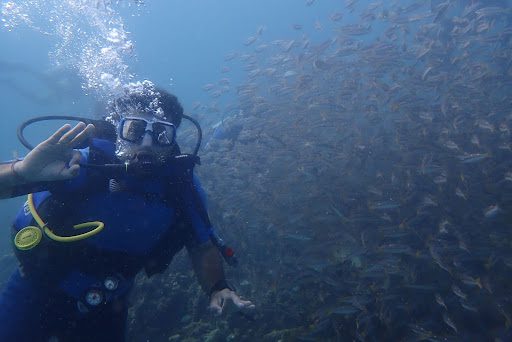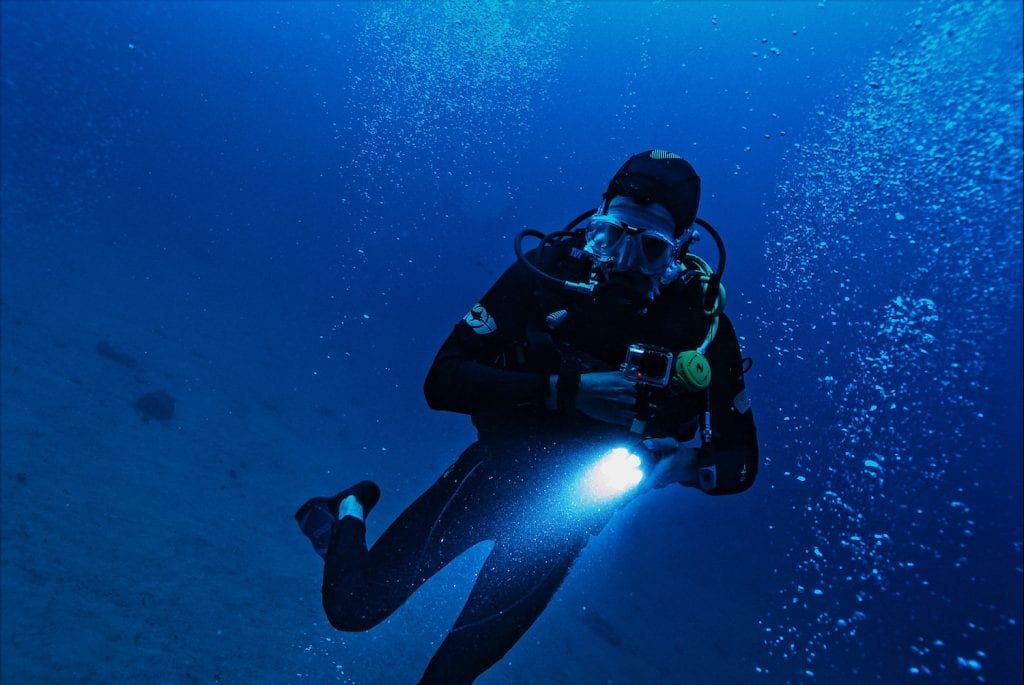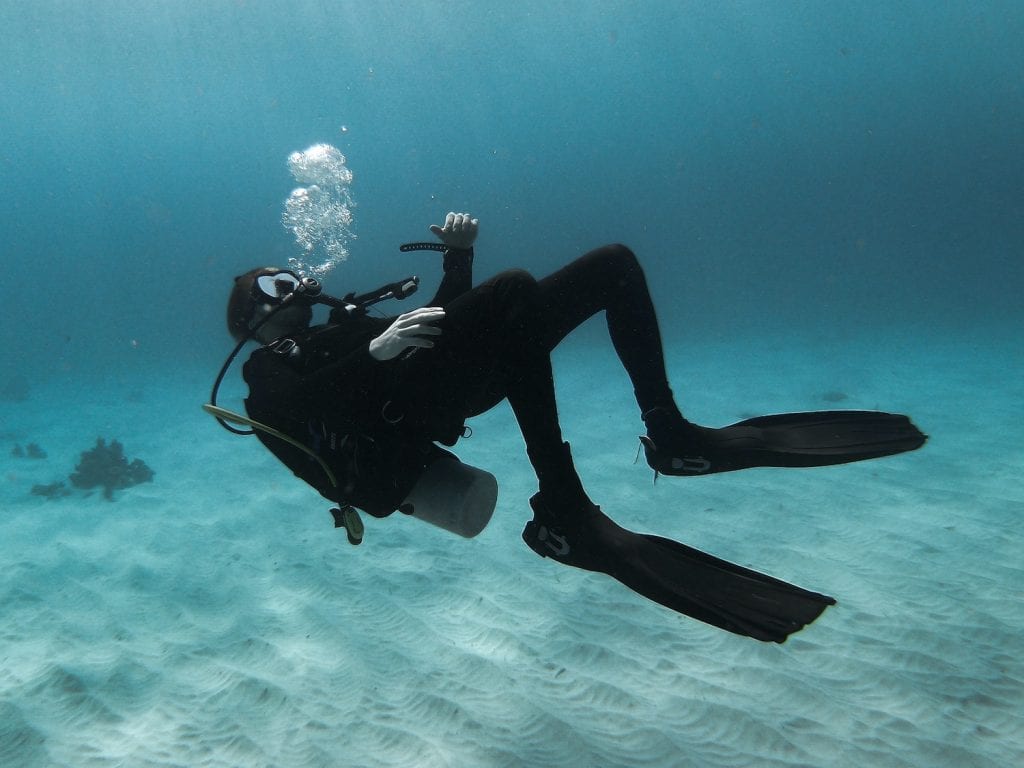
Ready to become a Divemaster? It’s a serious question and will often lead to other inquiries about the industry or its courses. In this blog, we’ll dive into a couple of common questions about what to expect.
As a Divemaster, you are responsible for organizing and leading recreational dives and supervising as a dive guide. You can also teach dive courses and complete scuba reviews.
Another opportunity as a Divemaster is that you are now qualified for the responsibility of overseeing scuba diving operations for salvages or work at a resort.
The Divemaster SCUBA diving lessons are typically very flexible and depending on one’s schedule, can be achieved in three weeks or up to six months. We have trained experts who will be able to provide one-on-one support during the lessons. Expect to learn more about theoretical concepts in the course ranging from the physics of diving to decompression theory and first aid.
When it comes to diving equipment, you want the best tools for the job. Must-haves like a snorkel, mask and dive computers should be at the top of your list. Some other diving equipment you may need to become a divemaster include:
The conditions when trying to achieve a SCUBA certification are some of the most challenging you’ll face. This is because divemasters want to help you flourish in any kind of water, so you can do the same to help your students.
Training typically occurs in a pool or in a confined area of water such as a very calm beach.
Make sure you know how to perform tasks like setting up gear, entering or exiting the water, basic underwater navigation techniques, safety and buoyancy control in any kind of water conditions.
In order to become a divemaster, you need to be 18 years or older, have at least forty (40) dives logged and successfully completed, a signed medical statement from your doctor within the past year before the course, and SCUBA certifications in Rescue Diver and Emergency First Responder courses.
Get ready to be tested on treading water for 15 minutes straight, swimming a distance of 400 meters and snorkeling for 800, and then tow a tired diver for 100 meters. Lastly, make sure you and a buddy know how to do a complete gear swap before obtaining your SCUBA diving certification.
Learning about theoretical dive situations and information will be a breeze if you’re motivated to participate and pass the test as well.
Time management, organization, good communication and patience are very important when it comes to becoming a good Divemaster. Overall, if you strive to be a role model as a dive professional then you will certainly inspire students and help them make progress.

The founder and Divemaster of Dreaming Sea Divers, John Phillips, has been passionate about SCUBA diving since he first took his Open Water Course in 2014. His experience also includes working on dive boats, fill stations and retail stores, so he’s learned a lot and is ready to assist others with fulfilling their dreams of working in the diving industry. John also is excited to meet many serious divers and turn their hobby into an enriching, fulfilling career. After all, who wouldn’t want a career that blends their passions with the ability to teach and earn an income from it all?
Dreaming Sea Divers can help you achieve your diving goals for any lifestyle, so click here to learn more about our programs.
Every day, thousands of people make the decision to take up scuba diving. If you are one of them, congratulations! Diving opens a lifestyle of adventure and new experiences unlike anything in our terrestrial world. You’ll feel weightlessness and interact with marine life of all shapes and sizes. Diving is exciting to be sure, but if you haven’t yet taken the plunge, you probably have questions and might even be a little apprehensive. To help make your transition from land to sea a little more comfortable, let’s explore what it’s like to “get certified.”
Open Water Diver is the introduction certification level that allows divers to dive independently—meaning not under the direct supervision of a qualified, active status diving instructor. Generally speaking, being “certified” means having successfully completed this level of diver training.
Open Water divers are certified to a depth of 60’ in saltwater and in conditions similar to those you were trained in.
You might be surprised to learn there are dozens—maybe hundreds—of certification levels including advanced diving options and countless specialty certifications like wreck diving and underwater photography.
After Open Water, Advanced Diver training is the typical next step. As an Advanced Open Water Diver, you’ll be introduced to more diving experiences including underwater navigation and the opportunity to explore depths to 100 feet.

While it is great to learn about future training options, you probably have questions about what your Open Water Diver Course will be like. Common questions among future Open Water Diver students are: Do I have to take my mask off? Do you need to be able to swim to scuba dive? Is it expensive?
Of course, there are countless questions would-be divers ask, but let’s examine these a bit. To begin, mask skills, i.e. removing and replacing your mask are important to scuba diving. A lot of divers fear removing their masks but are surprised to learn it is an easy skill to master.
First off, removing your mask underwater is the same sensation as ordinary swimming without a mask. It’s just water on your face. Something about breathing from a scuba regulator makes it seem more serious, but it really isn’t.
Even the slightest amount of exhalation pressure through your nose will keep you from sucking in water, so water up your nose isn’t a problem after minimal practice. For most divers, it’s never a problem. You can breathe normally without your mask. The weirdest part is that, while SCUBA diving, we only breathe in through our mouth which takes a minute or two to get used to. Once you have that down, clearing and even removing and then swimming without a mask on with the gear is simple.
Clearing your mask simply requires exhaling through your nose while you gradually tilt your head upward. Some masks hold so little water that even the head tilt isn’t necessary. Like most diving skills, you’ll quickly find just the right combination tilt and exhalation volume to clear your mask nearly instantly. Some students don’t believe that adding air to a mask will replace the water inside but it works!
The important message here is, don’t freak out about taking your mask off! It’s no big deal. Promise!
You will need to pass a simple proficiency test, which includes swimming 200 yards freestyle OR 300 yards with your mask, snorkel, and fins. To clarify, “freestyle” in this case means swim that distance pretty much any way you can without the aid of supplemental floatation. In other words, no blow-up ducky or water wings will be allowed.
Some divers choose the mask, snorkel & fins option and just do laps at a manageable pace. The exact number of laps depends on the pool you train in. In any case, it isn’t too much of a challenge for most people. If you set a world record lap time, your instructor won’t be able to verify it to the powers that be, so just go slow!
In addition to the swim, you’ll also be asked to tread water for 10 minutes. The “tread” is another frequent panic point, but seriously, you’ll only be treading water for ten minutes. You’d do it without a second thought if it weren’t a class.
In any case, that’s it for the swimming assessments. Not so hard, right? You don’t need to be able to swim, just snorkel and tread water.

Learning to scuba dive requires access to gear and a minimum level of training (Open Water Scuba Certification). Expensive is a subjective term, but for most who wish to learn to dive, the cost isn’t difficult to manage. Diving equipment can be rented and budget-minded divers often purchase one piece of gear at a time.
In most locations, diving instruction isn’t overly costly. Open Water Scuba Diver is a thorough course that you’ll only take once, so make sure you are comfortable with your instructor. Saving a few pennies in exchange for a miserable experience isn’t worth it.
In most cases, the “resort courses” you find in popular tourist locales are rushed and taught to the maximum ratios of student to instructor. These are typically more expensive than you’ll find where you live as well. If you are planning your first diving vacation, we recommend you learn to dive locally even if you’ll be renting gear onsite. You’ll enjoy better training and spend your days diving rather than in a class.
People new to diving often worry about mask and regulator skills, fixating on the things they fear. Don’t. You’ll find that it just takes a little practice to easily master them.
Diving is a community. You’ll be welcomed into our diving lifestyle with open arms. During your open water course, you’ll likely make lifelong friends and change your own view of the world around you. And you’ll probably never plan a vacation quite the same way.
If you’re still not sure, call us to schedule what some call a “try dive.” Try dive isn’t the best term, however, since you’ll have an opportunity to learn some of the skills you’ll master during your Open Water Diver course.
Whether you are ready to fearlessly charge into your certification course or are apprehensive about the unknown, diving offers a lifetime of real adventures. Ask us anything and we’ll be open and honest with you about what you should expect!